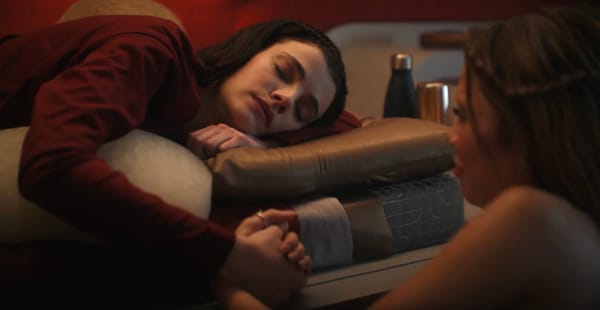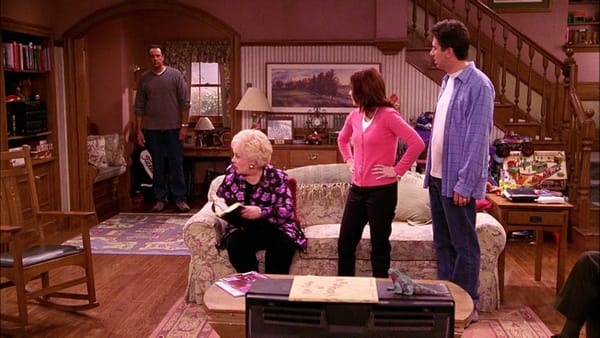Torchwood's queer utopia
How a Doctor Who spinoff became the queerest show on TV for its era
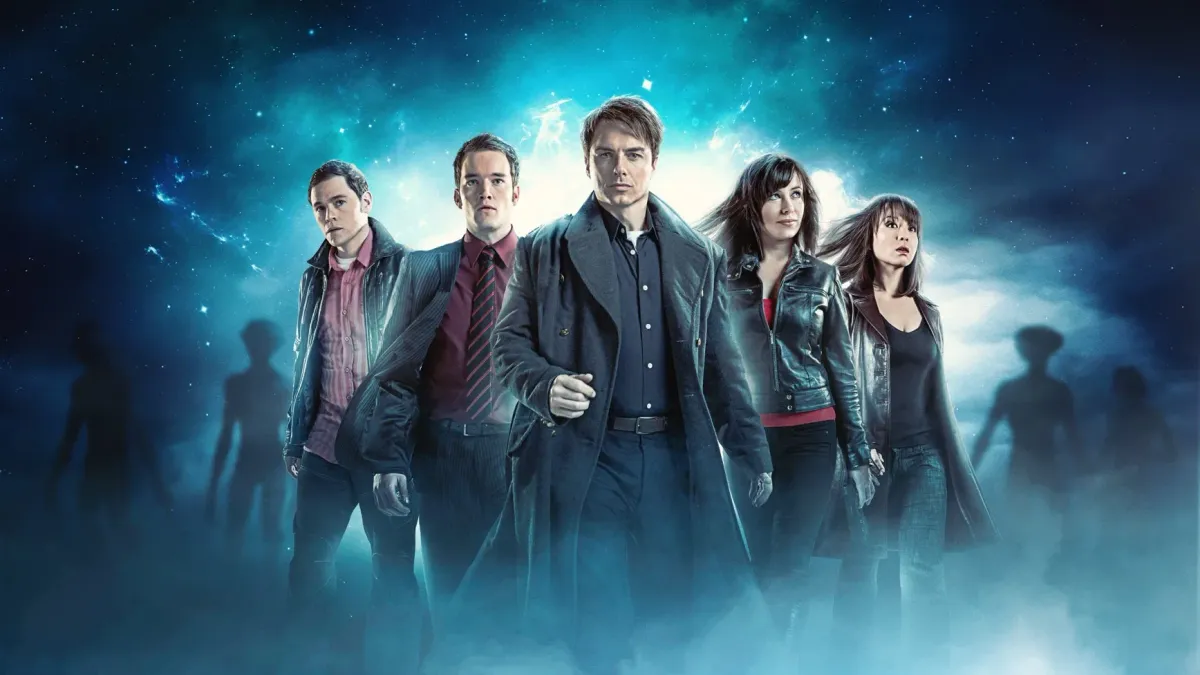
(Welcome to the Wednesday newsletter, this week on Thursday! Each week, I’m publishing a new pop culture essay from a freelancer. Remember: Your subscription fee helps me pay these freelancers for their efforts! This week: Nicky Watkinson on the unusually progressive queerness of the Doctor Who spinoff Torchwood.)
In the second episode of Torchwood, Gwen — the protagonist and audience stand-in, who has stumbled into a world of aliens, monsters, and immortals beneath Cardiff’s ordinary streets — ends up locked in an underground cell with a woman possessed by an alien. The alien craves sex, and Gwen finds herself locked in a passionate clinch with her.
The rest of the Torchwood Institute team is watching on a CCTV monitor, and one of them remarks, “I thought she had a boyfriend.” Captain Jack, the head of the Institute, charming and mysterious, responds, “You people and your quaint little categories.”
Viewers who came to Torchwood because of Doctor Who — the show in which Captain Jack first appeared and from which Torchwood spun off — would have already known that Jack is not only immortal and a time-traveler, but also canonically bisexual. In the series one finale of Who, Captain Jack kisses both the Doctor (technically an alien without fixed gender but played by male actors until 2017) and his female human companion, Rose.
When producers announced that Jack would be receiving his own spin-off show, his bisexuality (or “omnisexuality”, as it was frequently termed in the media and by the actor, John Barrowman, himself) was a key part of how the show was sold. Russell T. Davies, the showrunner of both Who and Torchwood, stated his intention that “without making it political or dull, [Torchwood] is going to be a very bisexual program.”
Positioned as Who’s grittier older sibling, Torchwood not only tackled sex and violence in more explicit ways than Who itself, but also expanded on many of Who’s core themes. Under Davies, Who had a number of key concerns that are variously reflected, refracted, and subverted in Torchwood.
Although these questions are explored to some degree of depth in Davies’s Who, Torchwood provides another layer of nuance to those explorations, offering a slightly more complicated approach to the franchise’s more existentialist areas. However, Torchwood doesn’t only function as a necessary companion piece to Davies-era Who; it’s also a compelling show in its own right, with a radical approach to queerness that is almost unbelievably ahead of its time for a BBC program airing in the mid-to-late noughties.
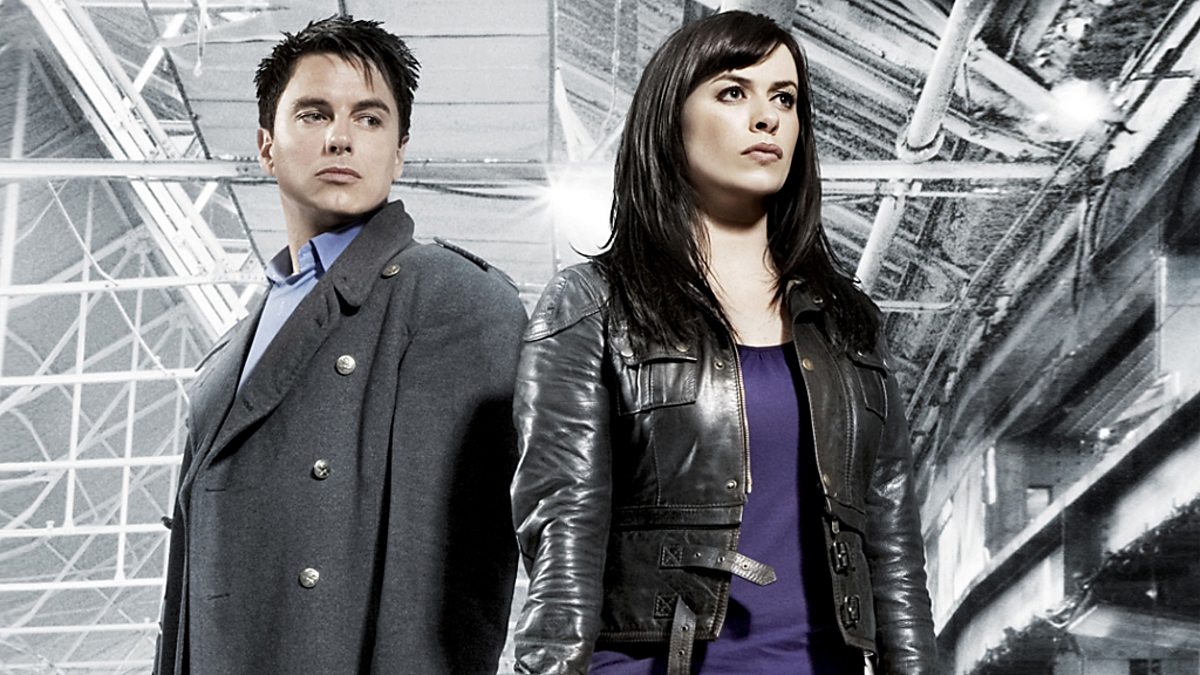
Doctor Who has always been centrally concerned with humanity, with ordinary people — the basic premise of the show, an alien who picks up human companions, makes this clear — but this was especially the case during Davies’s tenure.
The three regular companions from this era — Rose, Martha, and Donna — are all “ordinary” people, and the show makes it clear that they are valuable because they are ordinary, not in spite of that quality. In the first episode, Rose saves the day using skills learned in primary school gym class. As she prepares to swing out on a rope to save the Doctor, she says, “I’ve got no A Levels. No job. No future. But I’ll tell you what I have got. Jericho Street Junior School under-7s gymnastics team. I got the bronze.” She didn’t even win gold! It’s not Rose being a secret gymnast that saves the world. It’s her bravery, her tenacity, her absolutely ordinary upbringing in an ordinary school on an ordinary council estate in London. The Doctor revels in her ordinariness, in what he calls “the domestic approach.”
Similarly, throughout Donna’s time as the Doctor’s companion, her background as a temp is key to their success. In “The Sontaran Stratagem” she tells the Doctor that he’s wasting time with “all your storm troopers and your sonics” while she’s found something no-one else has: “I spent years working as a temp [...] the first thing I notice is an empty file.” They realize that no-one has ever called in sick — “Hundreds of people working here and no-one’s sick. Not one hangover, man flu, sneaky little shopping trip, nothing. Not ever. They don’t get ill.” In the series four finale, she cites a typing speed of 100 words per minute as she sets to work undoing the Daleks’ plan.
Torchwood echoes Who’s premise. The first episode follows Gwen, a human with a normal life that is suddenly disrupted by the actions of aliens and the Torchwood team. After the first episode, she decides that she can’t turn her back on this newly discovered alien world and agrees to join Torchwood, much like the Doctor’s companions.
In the case of Torchwood, though, this structure is complicated. In addition to Gwen, the audience stand-in, and Captain Jack, who is technically human (he was born on another planet in the 51st century), we also have Tosh, Owen, and Ianto, each of whom get their own storylines throughout the series. Rather than focusing on the dynamic between Gwen and Jack as a parallel of the Doctor’s relationship with his companions, Torchwood is an ensemble show that divides attention among the whole team.
Gwen is ordinary in the way that the Doctor’s companions tend to be, and she’s a valuable asset to the team because of this same “domestic approach.” She tells Jack that “You’ve been hidden down here too long, spending so much time with the alien stuff you’ve lost what it means to be human.” Being human is explicitly associated with ordinary, domestic behaviour — in the same episode, Jack tells her to “go home [...] eat lasagna. Kiss your boyfriend. Be normal.” Gwen is positioned as the heart of the show, compared to the rest of the team, who are callous and unaffected by the things they’ve seen; not only is she the only one of them to be in a relationship and have a life outside of Torchwood (although a relationship and life that are constantly threatened by Torchwood), she’s usually the only team member to think about other people’s feelings.
In the first episode, Gwen finds out about Torchwood after a series of gruesome murders, which all turn out to have been committed by Suzie, Jack’s second-in-command, so she can practice using an alien gauntlet that resurrects the dead. When confronted by Jack and Gwen, Suzie dies by suicide, leaving a spot open on the team for Gwen to join. In episode eight, another series of murders prompts the team to resurrect Suzie using the same technology. Gwen speaks to Suzie and theorizes that her obsession with the gauntlet came about because her father is dying, and chastizes the rest of the team for being careless: “Did you ever ask about her father? [...] He’s been dying slowly now for years, and what do you do? You give her the one thing that brings people back to life. Is it any wonder she got obsessed? [...] Did you ever stop and think? Did you ever look at Suzie? Did you ever think what that glove would do to her?”
Jack’s background also raises the question of what it means to be “human.” Do you need to be born on Earth? Do you need to be born within a certain number of years from the present-day of the show? Have humans of Jack’s birth era evolved beyond the humans of 2007? Is Jack still human after the events of the Who series one finale, now that he’s immortal?
The question of what it means to be human is repeatedly asked throughout Torchwood, with frequent plotlines revolving around part-human or human-possessed-by-alien characters. Early on, we discover that Ianto’s girlfriend Lisa is part-Cyberman — a race of colonising aliens whose aim is to convert all humans into Cybermen — having been halfway through the conversion process when she was rescued. Ianto hires a scientist to “make her human again,” but she turns on the scientist and kills him, explaining that she “wanted to repay him for helping me, by removing the weaknesses of his humanity.” In this episode and others like it, the show asks what makes us human, and when we stop being human and start becoming something else.
Torchwood also problematizes the idea that humans are innately good and aliens innately bad. In the third episode, “Ghost Machine,” alien technology causes problems, but only because it falls into the wrong hands. A tragic death comes about because human characters use the titular “ghost machine” to view the past and future, then try to act on knowledge that humans shouldn’t have. In another first season episode, “Countrycide,” there are no aliens at all; the antagonists are human cannibals, who murder and consume visitors to their village simply because they choose to, because “it made [them] happy.” In the miniseries Torchwood: Children of Earth, the monsters are not the 456 (the alien race who come to Earth and demand that 10 percent of the planet’s children be handed over to them) but the politicians, who agree to their demands and specifically choose to sacrifice the children who go to the lowest-performing schools, while disguising their choice as a random lottery to retain the good will of the public.
This tension between human and alien underscores both Who and Torchwood, albeit in slightly different ways. From its inception, Who has been about discovery, curiosity, and respectful encounters. When the Doctor fights aliens, it’s only when provoked. In the Davies era, it was immediately established that the Doctor didn’t want to harm aliens and wanted to peacefully encourage them to leave Earth alone. It’s Rose, not the Doctor, whose actions end up causing an alien consciousness to be killed in the first episode. The Doctor doesn’t carry a weapon, preferring just the sonic screwdriver; it becomes a running joke in series one that the Doctor doesn’t like guns. He always offers aliens a choice, and in series three, when he runs away from the Family of Blood, a family of aliens who are hunting him, it’s not because he’s afraid of them — it’s an act of mercy. It’s him “being kind” and trying to avoid having to kill them.
Where Who is about seeing the universe, Torchwood is about being ready. In the first episode, Jack tells Gwen that Torchwood is “arming the human race for the future,” and the show’s opening credits feature a voice-over monologue in Jack which reuses this and other phrases from the same scene. In Torchwood, weapons are central; Gwen has to be taught how to carry and shoot a gun, and the team frequently ends up killing the aliens they encounter, even when this isn’t strictly necessary. Since the Doctor and his companions (almost) always manage to escape unharmed, the consequences of the Doctor’s actions aren’t always felt in Who. Torchwood, on the other hand, interrogates these consequences, focusing on what happens to those who are left behind, those who are beyond the Doctor’s protection.
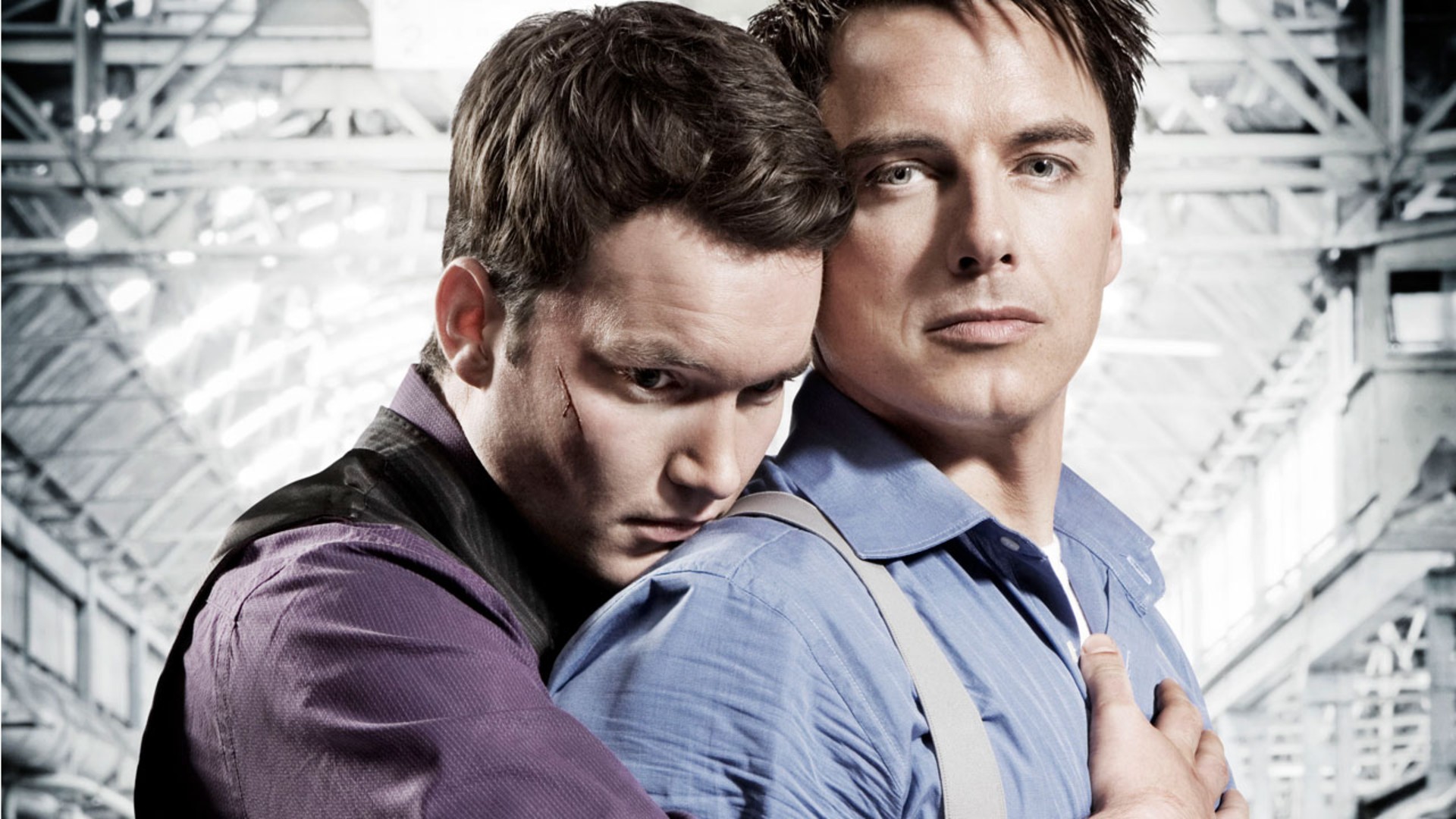
In most areas, Torchwood is Who’s grittier, more realistic older sibling, but the one area where Torchwood is more utopic and Who more conservative in their respective outlooks is in their treatment of queerness. Who does feature queer side characters — most prominently Jack himself, who appears in multiple episodes in the first four seasons. Mostly, though, it’s a very straight show, even though its main character is (or has the potential to be) genderfluid.
Torchwood, meanwhile, envisions a world where queerness is unremarked upon, sublimated, and casual. The rest of the team discusses Jack’s sexuality early on, but he never comes out or talks about his sexuality himself. Every other member of the Torchwood team is also seen to have onscreen relationships or sexual interactions with characters of their own and other genders. None of them can be considered either straight or gay. Although several of these queer interactions come about as a result of alien interference, raising some questions about consent, none of the characters ever express any regret, shame, or negative emotions regarding their actions. The show acknowledges that queerness is not the norm (“I’m shagging a woman… and an alien.” “Which is worse?” “I know which one my parents would say.”) while allowing its characters to have messy personal lives that aren’t endlessly discussed, dissected, or categorized.
Ianto is the only character who comes out in a traditional sense, but the scene in which he does is almost an afterthought to his character’s arc and relationship with Jack, a relationship that is almost entirely conducted offscreen, which never forms a central part of the show’s plot. We know the relationship exists, but we miss the traditional relationship markers — first kiss, first night together, intimate conversations, etc. — and only ever intrude on their moments together, as when Gwen interrupts them having sex.
This would be rare even now, when characters tend to be presented as explicitly pansexual/bisexual/gay/etc, and when we get more than one queer person per show, we usually only get one of each category (e.g. Brooklyn-Nine-Nine’s Holt is gay, while Rosa is bisexual, and their queerness is frequently discussed using these specific labels). In 2006, a five-person cast who all have onscreen same-sex kisses was legitimately groundbreaking. Additionally, there are none of the usual queer narrative tropes, like coming out, homophobia, or internal conflict. For a show that was explicitly marketed as realistic — in the first production meeting, Davies is reported to have said, “Compared to Doctor Who especially, this series is real” — it’s interesting that the one area where Torchwood isn’t gritty and dark is in its portrayal of queer characters. There are no attempts to be “realistic” by showing homophobic violence, using slurs, or any of the other negative tropes that often go along with contemporary portrayals of queer sexuality.
This is perhaps as a direct consequence of the time in which it was made – when bisexuality was commonly considered a quirky character trait rather than a legitimate sexuality. However, even if Torchwood’s inclusion of queer characters did begin as a marketing ploy to lend the show some gritty urban credence and distinguish it from Who, the end result is more than a “realistic” scifi show — Torchwood envisions a world where aliens and immortality exist but homophobia doesn’t, and provides a safe, camp space for queers to exist without their identities being under the spotlight.
Episodes is published three times per week. Mondays feature my thoughts on assorted topics. Wednesdays offer pop culture thoughts from freelance writers. Fridays are TV recaps written by myself. The Wednesday and Friday editions are only available to subscribers. Suggest topics for future installments via email or on Twitter. Read more of my work at Vox.
